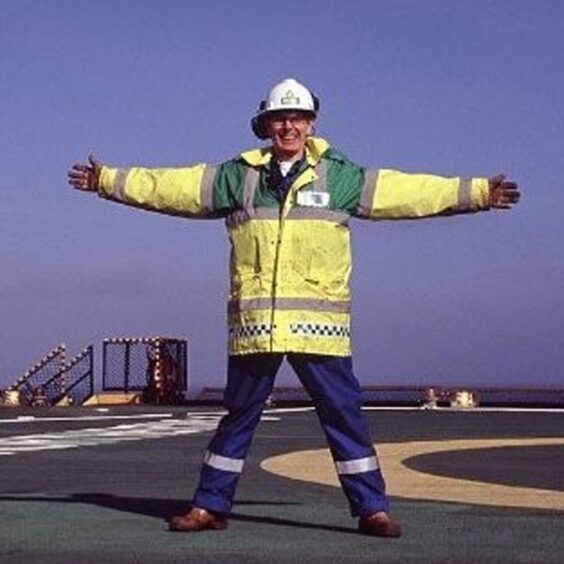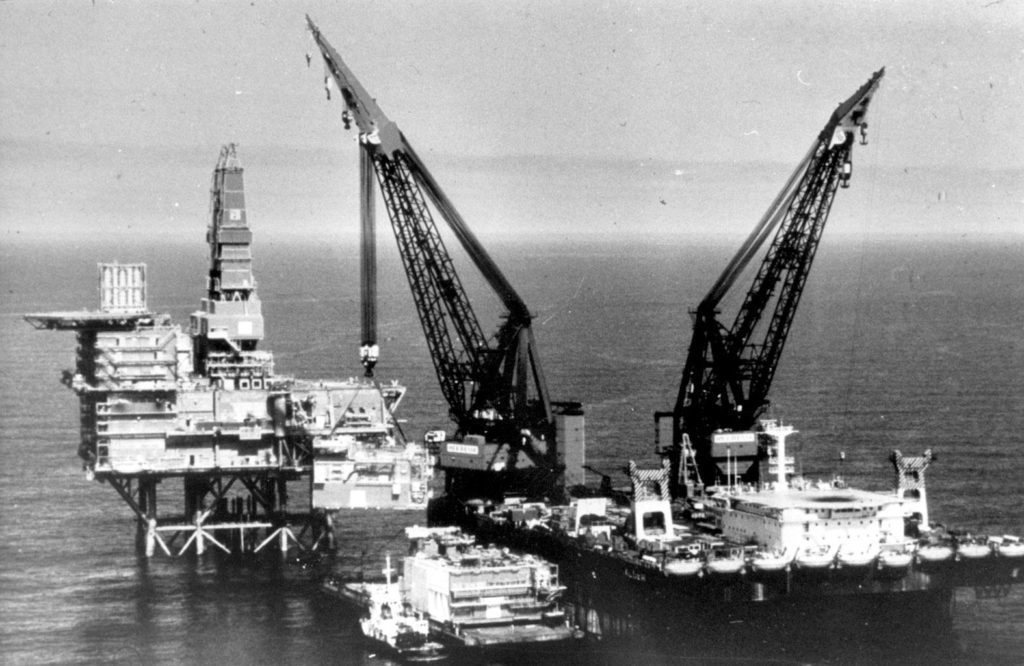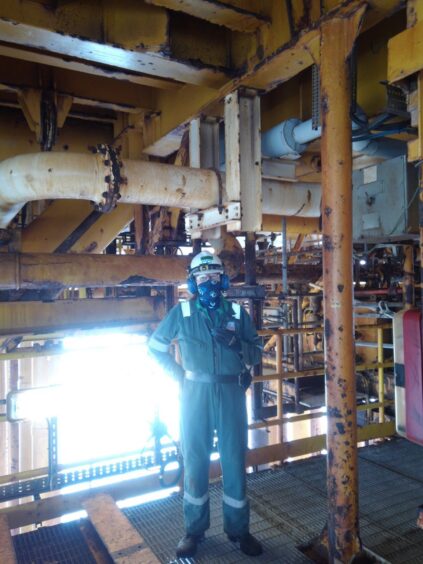Those who have served in the armed forces are often found working in the North Sea, but why is that? Former RAF nurse Dawn Wyvern thinks it could be the shared “banter”.
Wyvern worked in the North Sea after treating casualties from the Falklands War and serving in the Royal Air Force for over a decade.
Originally from Devizes, Wiltshire, the RAF nurse has worked across the UK in both her armed forces and offshore careers.
There are a lot of similarities between life offshore and in the armed forces, Wyvern explained, and this is one of the reasons why so many ex-servicemen and women gravitate towards the UK energy sector.
She worked with occupational health services provider, MCL Medics, as an occupational health nurse practitioner for over eight years, until March.
Wyvern no longer works offshore, but “had many highlights” from her time in the North Sea that she shared.
Before this, she worked for Petrofac on the Ninian Northern and with MCL on the Heather Alpha installations.
Can you tell us how long you served in the RAF?
I joined the RAF in 1974 and served 11 years as a PMRAFNS [Princess Mary’s Royal Air Force Nursing Service] Nurse, leaving in 1985.
During that period, I spent time working at base hospitals and a remote site in Shetland.
I had a few detachments for exercises and had a short period working for a summer season with the Red Arrows at RAF Kemble and a detachment to RAF Machrihanish in Scotland.
I was based for a time at PARAF Hospital Wroughton, which was the main aero-medical reception centre for the armed forces during the Falkland conflict, during which time I cared for various casualties in the Intensive Care Unit, and helped treat burn casualties.
My final base was RAF Chessington, which was a medical rehabilitation unit on the outskirts of London, caring for serving and retired personnel with various injuries and medical conditions.
After leaving the RAF, I worked in neurosurgery intensive care in Wimbledon before moving to the Southwest and working on a cardiac care and intensive care unit in Devon.
What attracted you to work in the North Sea?
To be very honest, money and work/life balance. I was working within the NHS and was having difficulty making ends meet and paying the mortgage, so needed to increase my income or lose our house. The initial offshore trip with Sana-Fe drilling was double my NHS pay and the 2×2 rota gave me more time at home than the NHS shift pattern.
I was lucky to get a regular rota straight away with a drilling company, so did not have the hassle of undertaking ad-hoc work and always waiting/chasing for jobs.
The offshore sector has a lot of ex-servicemen and women in its workforce. Why do you think that is?
There are many similarities in trade skills offshore and within the military, particularly with the Royal Navy skillset.
The fire and gas systems, electrical systems and mechanical requirements are inherent on ships and submarines.
The emergency response aspects of firefighting and safety at sea are more nautical-based than onshore-based requirements.
Whereas the need to manage being away from home for periods of time has similarities to the experience of all armed forces.
The ability to ‘get on’ with each other in an enclosed environment is another key part of working offshore, and this is very similar to how all the armed forces teams work.
However, tea shack ‘banter’ is universal in both offshore and military circles!
Were there similarities in culture across oil and gas and the armed forces?
The need for small teams and specialists within all branches of the armed forces is similar to offshore.
There is a need to rely on key personnel to manage specific parts of an operation, such as keeping an aircraft flying, a tank operational or a ship on patrol.
The preventive maintenance is part and parcel of the offshore life as it is within the military. There is even a ‘rank’ system offshore of lead tech, Sr tech and supervisor, which crosses over to NCO ranking in the military.
The difference is that there are no visible badges of rank to show hierarchy.
The drilling teams have a rigid ranking system throughout the industry, with roustabout, floorman, leading floorman, ass-Derickman, Derickman, ass-driller and Driller before going into the management roles.
How was your experience working offshore?
My initial experience in 1986 was one of awe, in that I was placed on a helicopter and sent to a large platform (NW Hutton) north of Shetland with over 200 people working 24/7.
The platform was massive to me at that time, with noise, dust and stairs, people using large pieces of equipment, and multiple work fronts going in all areas.
The first few days were confusing while I worked out what my main role was and what my reporting process should be.
The three-letter acronyms for roles and areas were very confusing at first, as these had no equivalent in my experience!
As with the military, it takes time to be accepted into the team; however, after a short time, I gained their accepted to be part of the crew, after my first ‘casualty’ as I was able to show the team that I actuality knew what I was doing and gained their respect.
The medical role was also integral to all the parts of the offshore operation, particularly preventive medicine where my input into the various risk assessments was required to prevent illness and injury from an occupational health perspective, and job planing to ensure safety factors were taken into account, such as escape/evacuation procedures for vessel entry etc.
Are there any particular highlights to your time in the North Sea?
In my time offshore, over 30 years, I have had many highlights, however, most of them are medical in nature, where individuals, who I have diagnosed and treated offshore, then sent onshore via med-evac or med-rescue for urgent care, have eventually come back to work.
I have been privileged to see Orcas and Whales swim past the platform a few times, to watch storms develop out at sea and experience the full force of nature, only to be replaced by flat mirror seas and unrestricted sunsets.
The people I have worked with have been amazing, accepting and often surprising. Everyone is an individual and has a life story to tell, experiences to share and their own unique outlook on life.
I have had the opportunity to work on drilling rigs, dive vessels, various floating platforms, and fixed production platforms, as well as onshore in the Gobi Desert, Mongolia.
Each one brings a new experience and way of working, but the core personality of the crew remains the same.
Would you recommend a career in the energy sector to those returning to civilian life?
In my opinion, the offshore environment is a comfortable and compatible step for former armed forces personnel, as it embellishes many of the work ethics and trade similarities, coupled with the camaraderie and humour/banter which is found in military circles.
The working away from home aspect will be familiar to many former military, as will the shift work, mass catering and accommodation, all be it the offshore standards are often higher in my experience.
Energy Vocations is sponsored by the award-winning team at the ASET International Energy Training Academy.
www.energyvoice.com (Article Sourced Website)
#Energy #Vocations #Dawn #Wyvern #tea #shack #banter #RAF #life

 © Supplied by Dawn Wyvern
© Supplied by Dawn Wyvern
 © Supplied by Dawn Wyvern
© Supplied by Dawn Wyvern